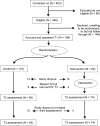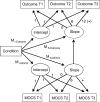How stress management improves quality of life after treatment for breast cancer
- PMID: 17154743
- PMCID: PMC5752106
- DOI: 10.1037/0022-006X.74.6.1152
How stress management improves quality of life after treatment for breast cancer
Abstract
The range of effects of psychosocial interventions on quality of life among women with breast cancer remains uncertain. Furthermore, it is unclear which components of multimodal interventions account for such effects. To address these issues, the authors tested a 10-week group cognitive-behavioral stress management intervention among 199 women newly treated for nonmetastatic breast cancer, following them for 1 year after recruitment. The intervention reduced reports of social disruption and increased emotional well-being, positive states of mind, benefit finding, positive lifestyle change, and positive affect for up to 12 months (indeed, some effects strengthened over time). With respect to mechanisms tested, the intervention increased confidence in being able to relax at will. There was also evidence that effects of the intervention on the various outcomes examined were mediated by change in confidence about being able to relax. Thus, this intervention had beneficial effects on diverse aspects of quality of life after treatment for breast cancer, which appear linked to a specific stress management skill taught in the intervention.
((c) 2006 APA, all rights reserved).
Figures



References
-
- Adler NE, Horowitz M, Garcia A, Moyer A. Additional validation of a scale to assess positive states of mind. Psychosomatic Medicine. 1998;60:26–32. - PubMed
-
- Alferi S, Carver CS, Antoni MH, Weiss S, Duran R. An exploratory study of social support, distress, and disruption among low income Hispanic women under treatment for early stage breast cancer. Health Psychology. 2001;20:33–41. - PubMed
-
- Altman D, Schulz K, Moher D, Egger M, Davidoff F, Elbourne D, et al. The Revised CONSORT statement for reporting randomized trials: Explanation and elaboration. Annuals of Internal Medicine. 2001;134:663–694. - PubMed

